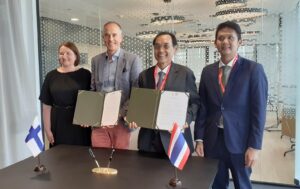11.9.2024
Åbo Akademi University establishes double master’s programme with Thai university
At the end of August, Åbo Akademi University received a delegation from Kasetsart University, Thailand, headed by the President Dr. Chongrak Wachrinrat. During the visit the universities signed a memorandum of agreement to establish a double master’s degree program, the first such program for Åbo Akademi with a partner outside Europe.
Kasetsart University (KU) is a highly ranked university in Thailand with 37 faculties and more than 70 000 students. The current double degree agreement between and ÅAU will provide our master’s students with interesting opportunities to combine studies in molecular life sciences at ÅAU with thesis projects at the Faculty of Veterinary Technology at KU that may, for example, deal with vector-borne diseases, plant-based pharmaceuticals, and the production of bioplastics. The collaboration also gives students the opportunity to familiarise themselves with new cultures, languages and study environments.
“This is an important step to increase our engagement in the Global South, which is also a priority within CHARM-EU, the European university alliance to which Åbo Akademi belongs since 2021”, says Rector of Åbo Akademi University, Mikael Lindfelt.
Patrik Henelius, dean of the Faculty of Science and Engineering, sees many opportunities in the increased collaboration with KU.
“KU’s commitment to a collaborative, multi-sectoral and interdisciplinary so-called One Health approach that strives to balance the health of humans, animals and ecosystems aligns very well with our faculty’s goals. I see a great scope for joint projects in education and research in connection to, for example life science, sustainable forestry, and marine and environmental biology.”
Professor of Biochemistry, Tiina Salminen has long collaborated with Wuttinun Raksajit, Dean Faculty of Veterinary Engineering at KU.
“My research collaboration with Dean Raksajit began when he was a postdoctoral researcher at the University of Turku. Since then, several Thai students have visited my research group to learn the methods of structural biology and bioinformatics and these visits have resulted in many publications. After these successful experiences, I became convinced that the master’s programme at KU corresponds well to our master’s programme and provides the basis for further development of educational cooperation between KU and ÅAU. Our research projects mapping molecular mechanisms in infection, inflammation and cancer with the aim of developing new diagnostics and therapies will certainly attract students from both universities.”
